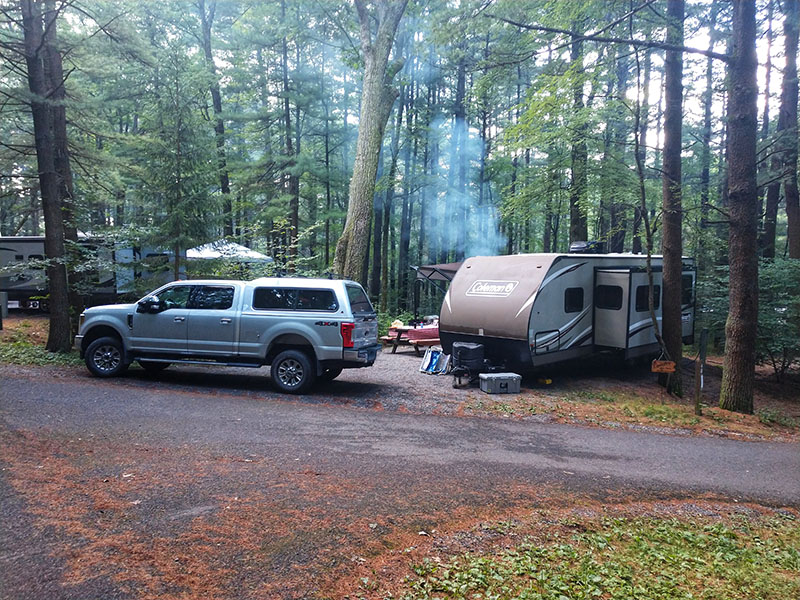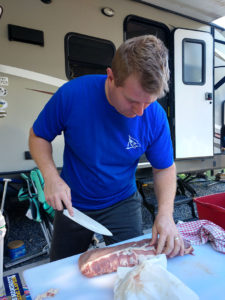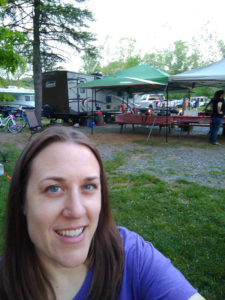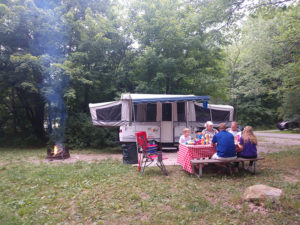
If you have tried to book a campsite at a corporation-owned campground this year, you may have had the option to “lock in” your site for an additional fee. Campground franchise chains, like Jellystone, now require you to pay an additional $20 to $30 to reserve a specific campsite. If you opt not to pay the fee, you are still guaranteed a site at the price level you requested, but the campground selects your site.
When you book a hotel room anywhere in the world, you don’t get to select your specific room – only the type of room you require. It’s usually the same thing with a table at a restaurant. Like Disney’s Fort Wilderness in Orlando, some campgrounds don’t even let you select specific sites and only guarantee the type of site you selected.
It is the prerogative of the campground owners and franchisees to charge whatever they desire for their services. However, this new trend of up-charging for preferred sites is problematic for a few reasons, and the campers I’ve surveyed have pretty strong feelings about it.
Are we willing to pay to save our site?
 This summer, we are traveling to the Smokey Mountains to hike and visit the local attractions. We’ve booked a site at the Jellystone Campground in Pigeon Forge. The campground offered to charge us an additional $20 per day to guarantee the site we had already selected when booking. We considered our options and decided that, since we will be spending most of our time away from the camper, the specific site we chose does not matter. We saved $140 by not opting to pay for the site locking fee.
This summer, we are traveling to the Smokey Mountains to hike and visit the local attractions. We’ve booked a site at the Jellystone Campground in Pigeon Forge. The campground offered to charge us an additional $20 per day to guarantee the site we had already selected when booking. We considered our options and decided that, since we will be spending most of our time away from the camper, the specific site we chose does not matter. We saved $140 by not opting to pay for the site locking fee.
On the other hand, later this summer, we will be traveling with two other families to the Finger Lakes to stay at the Watkins Glen KOA. When they insisted we pay a fee to guarantee our site, we grudgingly opted to pay it because we wanted to be near our friends.
Why up-charging for sites is problematic:
I don’t mind paying an up-charge in certain situations if the additional fee enhances my experience. For example, we will often purchase the photo package at resorts so that I don’t have to take photos myself. I can relax and still have tons of pictures of our experience at the end of our trip for a fee. The problem with the site fee is that you aren’t getting any additional services. The campgrounds charging these fees are already the most expensive campgrounds available, and yet they charge for the thing you already purchased.
 Another problem with lock-in fees is the possible (and probably unintended) discrimination. Some people select specific sites because they need to be near the office or restroom for physical reasons. Perhaps they are elderly and cannot make the long trek to the bathroom. Maybe they have a disability and would like to be closer to activities for accessibility reasons. Even if a campground offers handicapped sites, charging someone to lock in a spot they need due to a medical condition essentially makes them pay more because they have a disability. I’m not an ADA lawyer, but that seems legally sketchy
Another problem with lock-in fees is the possible (and probably unintended) discrimination. Some people select specific sites because they need to be near the office or restroom for physical reasons. Perhaps they are elderly and cannot make the long trek to the bathroom. Maybe they have a disability and would like to be closer to activities for accessibility reasons. Even if a campground offers handicapped sites, charging someone to lock in a spot they need due to a medical condition essentially makes them pay more because they have a disability. I’m not an ADA lawyer, but that seems legally sketchy
Charging more to provide no additional service also widens the gap between campers who can afford to pay to stay and those who cannot. The recent explosion in camping has increased the demand for campsites, enabling campgrounds to raise their prices. For many, camping has been a way to travel on a budget. This year, a family of five could pay up to $400 for a weekend stay at a campground. Like sporting events and concerts, the gap between those who can afford it and those who can’t grows wider every year.
Because people are willing to pay the fee, it’s probably here to stay. Our only recourse is to patronize campgrounds that don’t charge them or opt-out of locking in a site at those that do.
As for us, we will do our best to avoid them, but we will also be setting aside a little more in our camping budget for the next few years.
